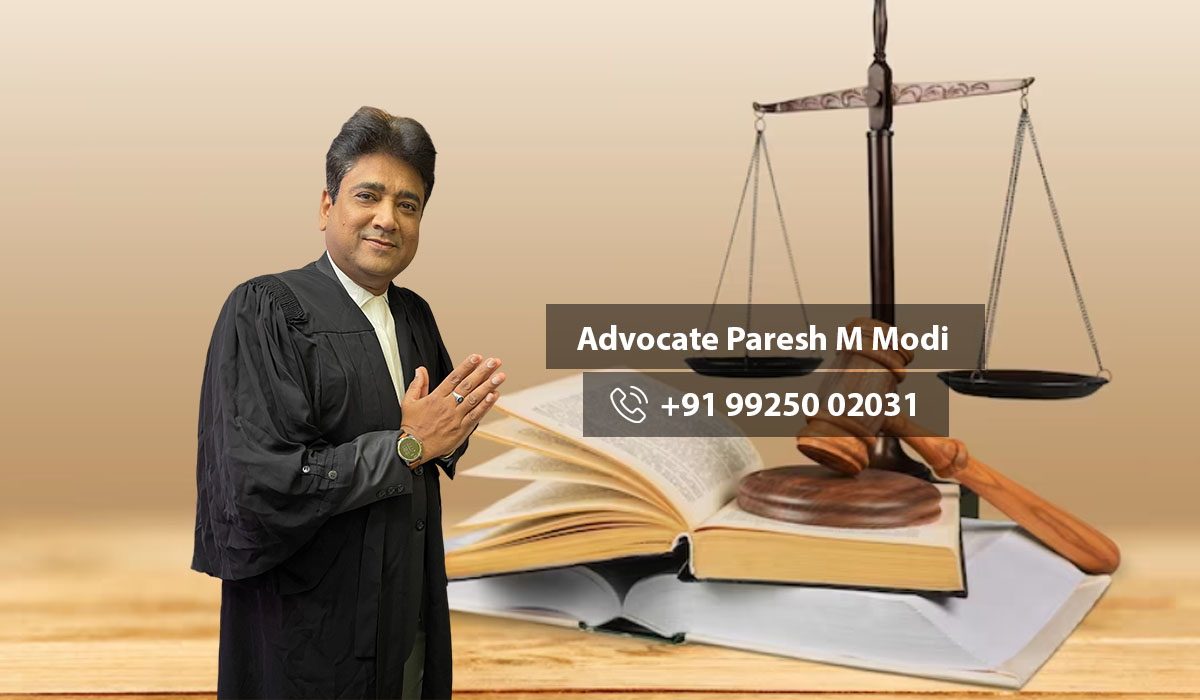Legal Remedies to Produce Additional Evidence/Documents in Criminal Appeal or Revision | Advocate Paresh M Modi | 9925002031
To produce additional documents that were not produced during the trial under the Negotiable Instruments Act (NI Act, 1881) in a Criminal Revision or Criminal Appeal, you have certain remedies under the Code of Criminal Procedure (CrPC, 1973), now replaced by the Bhartiya Nagarik Suraksha Sanhita, 2023 (BNSS). Here’s a complete legal analysis with remedies, sections, and favorable judgments, including mapping of CrPC sections with BNSS sections.
Legal Remedies to Produce Additional Evidence/Documents in Criminal Appeal or Revision:
✅ 1. Criminal Appeal – Power to Take Additional Evidence:
Old Section (CrPC):
Section 391 CrPC – “Appellate Court may take further evidence or direct it to be taken.”
New Section (BNSS):
Section 432 BNSS – Corresponds to CrPC Section 391.
Legal Position:
If the appellate court finds it necessary or in the interest of justice, it can allow production of additional evidence, even if it wasn’t presented at trial.
Key Points:
Must explain why the evidence was not produced earlier.
Should be relevant for proper adjudication of the matter.
Favorable Judgments:
Rajeshwar Prasad Misra vs The State Of West Bengal (AIR 1965 SC 1887): The Supreme Court held that additional evidence can be allowed if it is essential for just decision.
Rambhau and Anr vs State of Maharashtra (2001) 4 SCC 759: Court clarified that additional evidence under Section 391 should not be used to fill up gaps but can be permitted in the interest of justice.
✅ 2. Criminal Revision – Production of Additional Documents:
Old Section (CrPC):
Section 401 CrPC – Revisional powers of High Court.
Read with Section 397 CrPC – Calling records for revision.
New Section (BNSS):
Section 442 BNSS – Power of revision.
Read with Section 378 BNSS – Calling for records.
Legal Position:
Though revision is primarily based on the record, courts have permitted additional evidence in exceptional cases where injustice would otherwise be caused.
Favorable Judgment:
S. Mohan v. The State of Tamil Nadu, 2010 SCC Online Mad 3071: Madras HC allowed limited scope for new documents in revision in the interest of justice.
Chandrakant R. Rathi v. UOI (2007) CrLJ 788 (Bom): Bombay HC allowed additional documents in revision when the trial court rejected important documents wrongly.
How to Apply for Producing Additional Documents:
File an Application under:
Section 432 BNSS (formerly 391 CrPC) – In appeals.
OR request permission under Section 442 BNSS (formerly 401 CrPC) – In revision, with justification.
Enclose an Affidavit explaining:
Why the document was not produced during trial.
Why it is essential for justice now.
How it affects the outcome of the case.
Important Considerations:
| Factor | Appeal | Revision |
|---|---|---|
| New Evidence | Permitted (Sec. 432 BNSS) | Rarely permitted |
| Procedure | Application with affidavit | Same, but stricter scrutiny |
| Purpose | Substantial justice | To correct illegality or material irregularity |
Use in NI Act Cases (Section 138 / 139):
When appealing a conviction under Section 138 of NI Act, production of:
Bank account statements,
Loan documents,
Proof of repayment,
Handwriting samples,
Cross-examination materials not earlier introduced, etc., can be highly relevant and allowed under BNSS Section 432.
Final Summary of Sections:
| Purpose | CrPC Section | BNSS Section |
|---|---|---|
| Appeal – Additional Evidence | Sec. 391 CrPC | Sec. 432 BNSS |
| Revision – Powers | Sec. 401 CrPC | Sec. 442 BNSS |
| Revision – Call Record | Sec. 397 CrPC | Sec. 438 BNSS |
Section 374(3) CrPC vs Section 415(3) BNSS
🔸 Original Provision: Section 374(3) of CrPC, 1973
Section 374(3) of the Criminal Procedure Code, 1973 granted a statutory right of appeal to any person who is convicted in a trial conducted by a Magistrate.
Text (simplified):
“Any person convicted on a trial held by a Magistrate may appeal to the Court of Session.”
✔ This allowed:
A convicted person to appeal before the Sessions Court, whether the sentence is of fine, imprisonment, or both.
Even in cheque dishonour cases under Section 138 of NI Act, if conviction is by a Judicial Magistrate, the appeal lies to the Sessions Court under this section.
🔸 New Provision: Section 415(3) of BNSS, 2023
After the CrPC was repealed, BNSS (Bhartiya Nagarik Suraksha Sanhita), 2023 introduced a parallel provision in Section 415(3) which replaces the earlier 374(3) CrPC.
Text (simplified):
“A person convicted by a Magistrate may appeal to the Court of Session, unless the law bars an appeal for such offence.”
✔ What’s new:
The structure and purpose remain the same.
However, it adds an explicit exception that appeal may not be allowed if another law specifically bars it (like in minor or petty offences).
🔸 Importance in Document Production During Appeal
This section (CrPC 374(3) or BNSS 415(3)) provides the base legal right to file a criminal appeal against a Magistrate’s conviction order. Once the appeal is admitted under this provision, the production of additional evidence or new documents is governed under:
➡ Section 391 of CrPC (now BNSS Section 432):
The Appellate Court may, if it thinks additional evidence is necessary, either take such evidence itself or direct it to be taken by a Magistrate or subordinate court.
✅ Therefore:
You can apply under BNSS Section 415(3) to file an appeal.
Then request under Section 432 of BNSS for permission to produce additional/new documents that were not submitted during trial.
IN GUJARATI LANGUAGE
અપીલ અથવા રીવિઝન દરમિયાન નવા દસ્તાવેજો રજૂ કરવા માટેનો કાનૂની ઉપાય :
✅ 1. ફોજદારી અપીલ (Criminal Appeal) – નવા દસ્તાવેજો રજૂ કરવાની પરવાનગી:
જુના કાયદા પ્રમાણે (CrPC):
કલમ 391 CrPC – “અપીલ અદાલત વધુ પુરાવા લઈ શકે છે અથવા લાવવા આદેશ આપી શકે છે.”
નવી કલમ (BNSS – ભારતીય નાગરિક સુરક્ષા સંહિતા, 2023):
કલમ 432 BNSS – CrPC કલમ 391 ને બદલે ઉપયોગ થાય છે.
કાનૂની સ્થિતિ:
જો અપીલ અદાલતને લાગે કે ન્યાય માટે નવા દસ્તાવેજ જરૂરી છે, તો તેવા દસ્તાવેજો રજુ કરવાની પરવાનગી આપી શકે છે – તે પહેલાં ટ્રાયલમાં રજુ ન થયા હોય છતાં પણ.
મુખ્ય બાબતો:
શું કારણોસર એ દસ્તાવેજો ટ્રાયલ દરમિયાન રજુ ન થયા તે સમજાવવું ફરજિયાત.
દસ્તાવેજો કેસના ન્યાય પર સીધા અસર કરે એવા હોવા જોઈએ.
ફેવરેબલ ચુકાદાઓ:
Rajeshwar Prasad Misra vs The State Of West Bengal (AIR 1965 SC 1887): સુપ્રીમ કોર્ટે કહ્યું કે જરૂરી હોય ત્યારે વધુ પુરાવાની પરવાનગી ન્યાય માટે આપી શકાય છે.
Rambhau vs State of Maharashtra (2001) 4 SCC 759: અદાલતે સ્પષ્ટ કર્યું કે વધુ પુરાવા ખાલી ખોટા ગેપ્સ પૂરવા માટે નહીં પણ ન્યાય માટે ઉપયોગી હોય ત્યારે જ મંજૂર થાય.
✅ 2. ફોજદારી રીવિઝન (Criminal Revision) – નવા દસ્તાવેજોની રજૂઆત:
જુના કાયદા મુજબ (CrPC):
કલમ 401 CrPC – હાઈકોર્ટના રીવિઝનના અધિકાર.
સાથે સાથે કલમ 397 CrPC – રેકોર્ડ મંગાવવા માટે.
નવી કલમો (BNSS):
કલમ 442 BNSS – હાઈકોર્ટ કે સેશન કોર્ટના રીવિઝન અધિકાર.
સાથે સાથે કલમ 438 BNSS – અદાલત રેકોર્ડ મંગાવી શકે છે.
કાનૂની સ્થિતિ:
રીવિઝનમાં મુખ્યત્વે ટ્રાયલનો રેકોર્ડ જ ધ્યાનમાં લેવાય છે, પરંતુ ખાસ પરિસ્થિતિમાં જ્યાં ન્યાયમાં ભંગ થાય એવા કેસોમાં વધુ દસ્તાવેજ મંજૂર થઈ શકે છે.
ફેવરેબલ ચુકાદાઓ:
S. Mohan v. State of Tamil Nadu, 2010 (Madras HC): ન્યાય માટે રીવિઝનમાં દસ્તાવેજો મંજૂર કર્યા.
Chandrakant R. Rathi v. Union of India (2007) CrLJ 788 (Bom): ટ્રાયલ અદાલતે દસ્તાવેજો ખોટી રીતે નકારી નાખ્યા હોવાથી રીવિઝનમાં રજૂ કરવાની મંજૂરી આપી.
નવા દસ્તાવેજો રજુ કરવા માટે અરજી કેવી રીતે કરવી?
અરજી કરો:
BNSS કલમ 432 હેઠળ – જો અપીલ ચાલી રહી હોય.
અથવા BNSS કલમ 442 હેઠળ – જો રીવિઝન અરજી હોય.
એફિડેવિટ સાથે રજૂ કરો:
દસ્તાવેજ ટ્રાયલ દરમિયાન શા માટે રજૂ ન થયા તે વાત સ્પષ્ટ કરો.
દસ્તાવેજ હવે ન્યાય માટે કેવી રીતે જરૂરી છે તે લખો.
દસ્તાવેજ કેસના પરિણામને કેવી રીતે અસર કરે છે તે સમજાવો.
સાંકેતિક તફાવત – અપીલ અને રીવિઝન વચ્ચે:
| મુદ્દો | અપીલ | રીવિઝન |
|---|---|---|
| નવા દસ્તાવેજો | પરવાનગી છે (કલમ 432 BNSS) | ખાસ પરિસ્થિતિમાં જ |
| પ્રક્રિયા | અરજી + એફિડેવિટ | એફિડેવિટ સાથે ખાસ જસ્ટિફિકેશન |
| હેતુ | સંપૂર્ણ ન્યાય | કાનૂની ખામી સુધારવી |
NI Act (ચેક રિટર્ન કેસો – કલમ 138) માટે ઉપયોગી:
જો તમે NI Act ની કલમ 138 હેઠળ સજા સામે અપીલ કરો છો, તો નીચેના દસ્તાવેજો રજૂ કરી શકાય છે:
બેંક એકાઉન્ટ સ્ટેટમેન્ટ,
લોન અથવા પેમેન્ટ સંબંધિત દસ્તાવેજો,
હસ્તાક્ષર પરીક્ષણ માટેના નમૂના,
અન્ય વ્યક્તિઓના વર્તન સંબંધિત પુરાવા,
ટ્રાયલ વખતે રદ થયેલ દસ્તાવેજો
આ બધા દસ્તાવેજો BNSS કલમ 422 હેઠળ રજૂ કરવા માટે અરજી કરી શકાય છે.
કલમોની સરખામણી (CrPC vs BNSS):
| હેતુ | CrPC કલમ | BNSS કલમ |
|---|---|---|
| વધુ પુરાવા અપીલમાં | 391 CrPC | 432 BNSS |
| રીવિઝન – અધિકાર | 401 CrPC | 442 BNSS |
| રીવિઝન – રેકોર્ડ મંગાવવા | 397 CrPC | 438 BNSS |
CrPC કલમ 374(3) અને BNSS કલમ 415(3)
🔸 જૂની વ્યવસ્થા: CrPC કલમ 374(3)
ફોજદારી પ્રક્રિયા સંહિતા, 1973 હેઠળની કલમ 374(3) એ એવો કાયદાકીય હક આપતો હતો કે જો કોઈ વ્યક્તિ મેજિસ્ટ્રેટ દ્વારા ટ્રાયલમાં દોષિત ઠેરવાઈ હોય, તો તે વ્યક્તિ સેશન કોર્ટમાં અપીલ કરી શકે છે.
સરળ ભાષામાં કલમ 374(3):
“મેજિસ્ટ્રેટના ટ્રાયલમાં દોષિત ઠેરવાયેલી વ્યક્તિ સેશન કોર્ટમાં અપીલ કરી શકે છે.”
✔ આ કલમના અમલથી:
કોઈપણ દોષિત વ્યક્તિ માટે સેશન કોર્ટમાં અપીલ કરવી કાયદેસર રીતે મંજૂર છે.
ખાસ કરીને ચેક રિટર્ન (NI Act, 138) કેસોમાં, જો મેજિસ્ટ્રેટ દ્વારા દોષિત ઠેરવાયું હોય, તો સેશન કોર્ટમાં અપીલ શક્ય છે.
🔸 નવી વ્યવસ્થા: BNSS (2023) ની કલમ 415(3)
CrPC હવે રદ થઈ ગયેલા હોવાથી, તેના સ્થાને BNSS – ભારતીય નાગરિક સુરક્ષા સંહિતા, 2023 લાવવામાં આવી છે. CrPC ની કલમ 374(3) હવે BNSS કલમ 415(3) દ્વારા બદલવામાં આવી છે.
સરળ ભાષામાં BNSS કલમ 415(3):
“મેજિસ્ટ્રેટ દ્વારા દોષિત ઠેરવાયેલી વ્યક્તિ સેશન કોર્ટમાં અપીલ કરી શકે છે, સિવાય કે એવો ગુનો હોય જેમાં કાયદા મુજબ અપીલ નહીં થાય.”
✔ અહીં શું નવા મુદ્દા છે:
માળખું અને હક અગાઉની જેમ જ છે.
પરંતુ હવે સ્પષ્ટ રીતે ઉમેરવામાં આવ્યું છે કે ક્યારે અપીલ નહિ થાય, જેવા કે નાના ગુનાઓ જ્યાં કાયદા દ્વારા અપીલ પર પ્રતિબંધ છે.
🔸 દસ્તાવેજો રજૂ કરવા માટે આ કલમનું મહત્વ
CrPC 374(3) કે BNSS 415(3) એ કોઈ વ્યક્તિને અપીલ કરવાની પરવાનગી આપે છે. જ્યારે અપીલ દાખલ થાય છે, ત્યારે તેમાં નવા પુરાવા કે દસ્તાવેજો રજૂ કરવા માટે નીચેની કલમ લાગુ પડે છે:
➡ CrPC કલમ 391 (હવે BNSS કલમ 432):
જો અપીલટ કોર્ટ માનશે કે વધુ પુરાવા જરૂરી છે, તો તે પોતે તે પુરાવા લઈ શકે છે અથવા મેજિસ્ટ્રેટને તેના માટે નિર્દેશ આપી શકે છે.
✅ એટલે કે:
પહેલું પગલું: BNSS કલમ 415(3) હેઠળ અપીલ દાખલ કરો.
બીજું પગલું: BNSS કલમ 432 હેઠળ અરજી કરીને નવા દસ્તાવેજો કે પુરાવા રજૂ કરવાની પરવાનગી મેળવો.
Contact Advocate Paresh M Modi
In Ahmedabad, Gandhinagar, Gujarat, Mumbai, Maharashtra, Pune, Delhi, For legal consultation or representation in matters of Anticipatory bail, Regular bail, Discharge Applications, Special Act Cases, FIR Quashing, Cheque Return Cases, or Criminal Appeals and For expert legal advice and services, Advocate Paresh M Modi can be contacted during office hours.
- Office Landline: 079-48001468 (Time 10:30 AM to 6:30 PM, Monday to Saturday).
- WhatsApp SMS: 9925002031 (Time 9:00 AM to 9:00 PM).
- Email: advocatepmmodi@gmail.com.
- Website: www.advocatepmmodi.in.
- Office Address: Office No. C/112, Supath-2 Complex, Opp. Kohinoor Plaza Hotel, Near Old Wadaj Bus Stand, Ashram Road, Ahmedabad – 380013, Gujarat, India.





